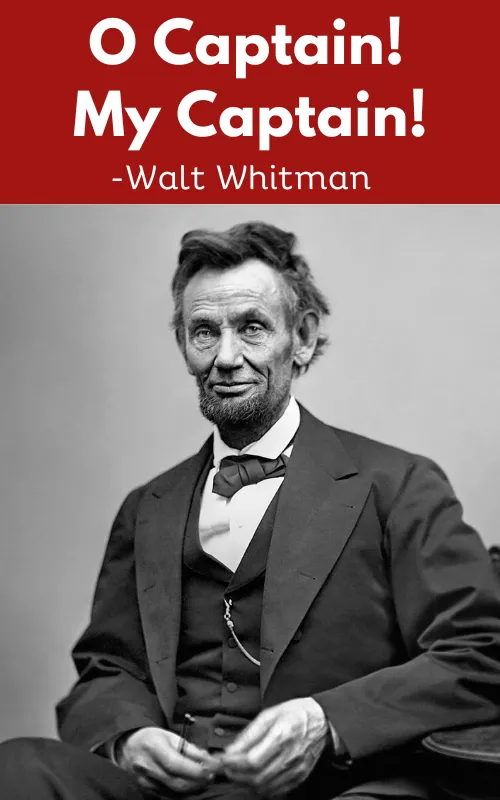About the Poem “O Captain! My Captain!“
| Poem Title | O Captain! My Captain! |
| Author | Walt Whitman |
| Publication Year | 1865, |
| Style | Lyric and elegiac |
| Form | Rhymed quatrains |
| Theme | Mourning the death of Abraham Lincoln, the captain representing the fallen president |
| Tone | A mix of grief, praise, and loss |
| Rhyme scheme | AABBCCDD |
| Structure | Three stanzas of eight lines each |
| Setting | Metaphorically, on a ship’s deck during a victory voyage |
| Central Metaphor | The ship symbolizes the United States, the captain represents Abraham Lincoln, and the voyage represents the nation’s journey |
| Symbols | Captain: Abraham Lincoln, symbolizing leadership and guidance Ship: The United States, symbolizing the nation Decks and bells: Symbols of celebration turned into mourning |
Themes of O Captain! My Captain!
The poem “O Captain! My Captain!” by Walt Whitman has several themes:
- Mourning and Loss ➤ The poem expresses the speaker’s deep sorrow and mourning for the death of a beloved leader or captain (Abraham Lincoln), symbolizing the nation’s grief over his assassination.
- Patriotism and Loyalty ➤ It reflects the speaker’s unwavering love and loyalty to the captain and the country, highlighting the strong bond between a leader and their followers.
- Victory and Tragedy ➤ The poem juxtaposes the joy of a successful journey with the tragedy of the captain’s death, emphasizing the bittersweet nature of achievement.
- The Price of Progress ➤ It underscores the sacrifices made to achieve progress and freedom, as symbolized by the captain’s life given for a noble cause.
- A Nation Divided ➤ The poem indirectly addresses the division and conflict within the nation during the Civil War, emphasizing the need for unity and mourning the loss of a unifying figure.
O Captain! My Captain! Summary & Analysis
Walt Whitman’s poem “O Captain My Captain” is about the death of President Abraham Lincoln. The poem is written in the voice of a sailor who is mourning the loss of his captain. The speaker compares Lincoln to a captain who has led the ship of state through a dangerous storm (the Civil War). Now that the war is over and the ship has reached safety, the captain is dead.
Stanza 1
O Captain! my Captain! our fearful trip is done,
The ship has weather’d every rack, the prize we sought is won,
The port is near, the bells I hear, the people all exulting,
While follow eyes the steady keel, the vessel grim and daring;
But O heart! heart! heart!
O the bleeding drops of red,
Where on the deck my Captain lies,
Fallen cold and dead.
Summary: The speaker begins the poem by addressing his captain, who has died. He exclaims that the journey is finally over and the prize has been won. The ship has weathered all storms and is now approaching the port. The people are celebrating, but the speaker’s heart is heavy with grief. He sees his captain lying dead on the deck, his blood staining the wood.
Stanza 2
O Captain! my Captain! rise up and hear the bells;
Rise up—for you the flag is flung—for you the bugle trills,
For you bouquets and ribbon’d wreaths—for you the shores a-crowding,
For you they call, the swaying mass, their eager faces turning;
Here Captain! dear father!
This arm beneath your head!
It is some dream that on the deck,
You’ve fallen cold and dead.
Summary: The speaker pleads with the Captain to rise up and hear the bells of victory. They tell him that the people are calling for him, and that he is loved and respected. The speaker’s grief is so great that they cannot believe that the Captain is actually dead. They hope that it is all just a dream.
Stanza 3
My Captain does not answer, his lips are pale and still,
My father does not feel my arm, he has no pulse nor will,
The ship is anchor’d safe and sound, its voyage closed and done,
From fearful trip the victor ship comes in with object won;
Exult O shores, and ring O bells!
But I with mournful tread,
Walk the deck my Captain lies,
Fallen cold and dead.
Summary: The speaker realizes that the Captain is truly dead. He has no pulse, and he does not respond to the speaker’s touch. The ship has reached its destination, but the speaker is left with a deep sense of loss. The speaker contrasts the public celebration with their own private grief. They walk the deck alone, mourning the loss of their Captain.
FAQs from O Captain! My Captain!
What is the meaning of the poem O Captain, My Captain?
O Captain, My Captain! is a lament for the death of President Abraham Lincoln, who is metaphorically compared to the captain of a ship that has just won a long and difficult war.
What is the moral lesson of the poem O Captain, My Captain?
The moral leasson of the poem is that victory comes with a price.
What is the irony in O Captain, My Captain?
The irony in O Captain, My Captain! is that the captain has led his ship to victory, but he has died at the moment of triumph.
Why does the poet’s heart bleed?
The poet’s heart bleeds for his fallen captain, Abraham Lincoln, and the country he loved.
What does dear father means in O Captain My Captain?
Dear father in O Captain! My Captain! means a loving and respected leader.
What had dropped on the deck after the death of the captain?
Blood dripped onto the deck after the captain’s death.
What is the conclusion of the poem O Captain My Captain?
The conclusion of O Captain! My Captain! is that the speaker’s beloved captain (Abraham Lincoln) is dead, and the speaker is deeply grieving his loss.











